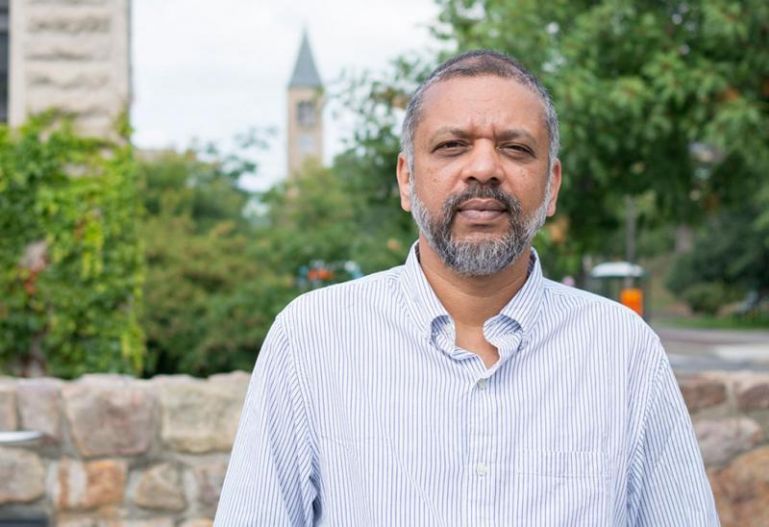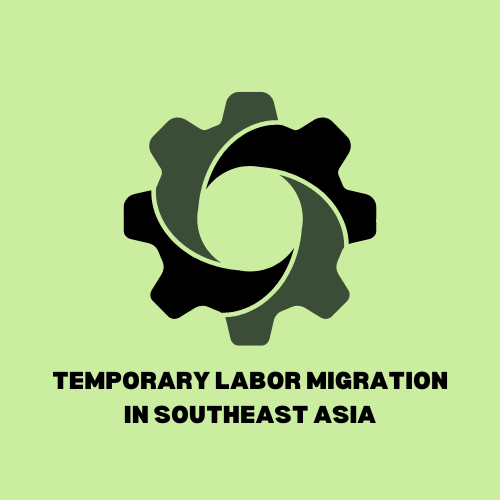Development, Law, and Economics
The Enduring Business Case for Sustainability

Sarosh Kuruvilla, SEAP
Sarosh Kuruvilla on sustainability in the textile industry.
Additional Information
The High Cost of Our GDP Obsession

Economic Inequality, Threats to Democracy, and Climate Crisis
Kaushik Basu (IES/SAP) writes about the limitations of GDP as an indicator of economic well-being.
Additional Information
Topic
- Development, Law, and Economics
Program
CRADLE Director Kaushik Basu Named Co-chair of UN Panel

Experts to Think Beyond GDP, Toward Sustainability
Gross Domestic Product (GDP) is heavily relied upon as a gauge of prosperity, but does not measure sustainable practices that consider the planet.
Additional Information
Temporary Labor Migration in Southeast Asia

GETSEA Mini-Course deadline extended to May 17
Taught by Kurt W. Kuehne, New York University Abu Dhabi
Offered virtually from June 24 to July 30, 2025, Tuesdays, 8:00pm-10:00pm Eastern Time. (Check this against your local time zone using a tool like this one)
Additional Information
Social Media and Playing at Democracy

Kaushik Basu, IES/SAP/CRADLE
In this op-ed, CRADLE director Kaushik Basu argues that social media has given the super-rich new tools to manipulate public opinion.
Additional Information
Topic
- Development, Law, and Economics
- World in Focus
Program
How scientists are using behavioral studies to help solve elephant-human conflict in Thailand

Joshua Plotnik featured on CBS 60 Minutes
CBS’s “60 Minutes” Profiles Work of Elephant Researcher Joshua Plotnik, who gave a Gatty several years ago and studied with our own Thak Chaloemtiarana!
View the full segment here: https://www.cbsnews.com/news/scientists-using-behavioral-studies-to-help-solve-thailand-elephant-human-conflict-60-minutes-transcript/
Additional Information
World at a Turning Point Interview

Human Development Report Director, Lead Author
UNDP's Dr. Pedro Conceição speaks with us during the Oct. 3–5 CRADLE conference on the state of the global economy.
This year's CRADLE conference, The World at a Turning Point: Cornell Conference on Development Economics and Law, takes stock of the global economy, with a special focus on the changing nature of labor markets, technological progress, inequality, climate change, and related laws and regulations. The three-day event is cosponsored by the Einaudi Center and the Department of Economics in the College of Arts and Sciences (A&S).
"Even if a country implements all the right policies, … it is still vulnerable to shocks that may emanate not from shortcomings of what it does within borders, but from the fact that countries are not coming together to address challenges."
On this page: Pedro Conceição, director of the United Nations Development Programme's Human Development Report Office, speaks with Arpit Chaturvedi, Cornell MPA ’18 and research manager to CRADLE cofounder and Carl Marks Professor of International Studies Kaushik Basu (A&S).
“Under Pedro Conceicao’s leadership, the Human Development Report has become one of the most important documents coming out of a multilateral institution,” Basu said. "It has widened the meaning of ‘human development’ and does not hesitate to wade into controversial themes and ideas."
Attend the Conference: The World at a Turning Point
A Conversation with Pedro Conceição
The UNDP Human Development Reports rarely focus on political issues, but the 2023–24 report released on Sept. 30 dedicates a chapter to political polarization. Why is addressing polarization crucial for providing global public goods?
For the most part, we know the kind of policies that would help countries and the international community to address shared challenges, from climate change to migration. The barriers to implementing these very rational—even obvious—policies seem to encounter difficulties that, it seems to us, lie beyond the realm of smart, technical policy advice.
For instance, shifting incentives toward decarbonized economies would benefit from increasing the cost of carbon, but that has been incredibly difficult to implement, both within many countries and internationally. Also, many high-income countries face declining fertility rates, shrinking populations, and challenges such as labor shortages and pension sustainability. Yet, immigration, which would help quite a bit, is incredibly difficult to manage.
In both cases, the difficulties lie more in the patterns of political polarization than in the technical details of what the solutions might be. So we felt that we needed to look into that a little bit to understand the meta-interventions that would make implementing the solutions to some of these challenges more likely to succeed.
The new report highlights how mismanaged interdependence, as seen in COVID-19, worsened inequalities. What lessons can be learned? How should institutions evolve to empower individuals in areas like climate change and digital governance?
One of the big takeaways is that even if a country implements all the right policies, makes all the right investments, and has “perfect” institutions, it is still vulnerable to shocks that may emanate not from shortcomings of what it does within borders, but from the fact that countries are not coming together to address challenges.
One of my big worries is that we look at the COVID-19 pandemic, and we think that we have gotten over the bump and fail to draw the most important implications about the failures of collective action of countries in the international community. Or that we look at it as a sectoral challenge—a health problem—to be addressed by, say, a pandemic treaty.
That is needed, of course, but our report invites us to reflect on a broader set of challenges in which countries are interdependent: pandemics are an example, but so is climate change. The global public goods framework helps us understand what is common to these challenges.
That analytical framework also enables us to understand what works and what works less well. For instance, because sovereign countries can always choose to leave an international treaty at will, we have to figure out ways they find it in their interest to remain in treaties. The trick is to have them realize that when it comes to global public goods, there are no zero-sum (competitive) dynamics, and structure incentives so that countries come on board.
You've had a unique career path, transitioning from physics to economics and public policy and now working in political economy at UNDP. What inspired these shifts?
I may have been guided by two things. One, curiosity. As a teenager, I wanted to understand the world through physics, particularly relativity, and quantum mechanics, which led me to study the math behind those theories throughout college. That took me through my college years and to my first professional experience, working on nuclear fusion in a European research project close to Oxford.
Over time, my curiosity was less about the science as such, and more about what kind of difference science could make in improving people’s lives. I became interested in science, technology, and innovation policy, and my curiosity broadened to other aspects that could improve standards of living, culminating with my ongoing interest in economic development.
I guess the other thing that drove me was trying to figure out where I could contribute the most. I was an average physicist, but it became clear to me that I would have to try to make more of a difference in other fields, so I studied economics and public policy and sought opportunities to learn and work in places where I could engage analytics to support decision-making.
Learn more about CRADLE and find out how to submit a paper to the open-access paper series.
Additional Information
Economics, Empathy, and the U.S. Election

Kaushik Basu, IES/SAP/CRADLE
“The current debate about outsourcing is often framed as a battle between workers…. But this overlooks the fact that outsourcing is fundamentally a labor-versus-capital issue,” writes CRADLE's Kaushik Basu.
Additional Information
Fall 2024 SEAP Bulletin now available

In print at our offices, or on eCommons
View the digital version on eCommons below, or stop by our offices at Uris Hall or the Kahin Center for physical copies.
Additional Information
Global Experts Convene at Johnson Museum of Art to Discuss Indonesia’s Political Future
Ithaca, NY
The Southeast Asia Program recently hosted a workshop at the Johnson Museum of Art titled “The State of Indonesian Democracy” on August 1 and 2, 2024. This gathering brought together sixteen leading specialists in Indonesian politics to dissect the ramifications of February’s presidential and parliamentary elections for Indonesian democracy, and to assess the future trajectory of Indonesian politics under its next president, Prabowo Subianto.
Tom Pepinsky, Walter F. LaFeber Professor of Government in the College of Arts & Sciences and Director of the Southeast Asia Program, said of the workshop: “The major accomplishment of our workshop was to gather together scholars from around the world to discuss the state of Indonesian democracy in the wake of the 2024 presidential and legislative elections. The participants exchanged views about potential sources of democratic weakness under the outgoing administration of Joko Widodo, and the future of Indonesian democracy under its new president, Prabowo Subianto. As part of these discussions, paper authors received close and careful feedback from expert discussants, which will allow them to revise their drafts for future publication. The open discussions fostered a critical but collaborative atmosphere in which early career researchers and established Indonesia experts were able to refine their arguments and analyses in light of the most up-to-date developments.”
The first panel featured presentations from Marcus Mietzner of Australian National University (participating virtually) and Djayadi Hanan of Universitas Islam Internasional Indonesia, with Diego Fossati from City University of Hong Kong serving as the discussant. This session examined the decline of Indonesian democracy under former President Joko Widodo, including a detailed look at his majoritarian tendencies and structural changes to the presidency.
After a coffee break, the second panel featured Burhanuddin Muhtadi from Indikator and the Syarif Hidayatullah State Islamic University and Yoes Kenawas from Atma Jaya Catholic University, with Meredith Weiss from University at Albany-SUNY as the discussant. This panel focused on the question of whether Indonesia’s democratic regime has declined into competitive authoritarianism, and how dynastic politics has eroded democratic competition at the local and national levels.
Following a lunch and tour of the Fall Creek gorge, the third panel included Amalinda Savirani from Universitas Gadjah Mada and Meredith Weiss, alongside Merlyna Lim from Carleton University, with Margaret Scott from New York University and the New York Southeast Asia Network as the discussant. This session examined democratic regression at the subnational level, and the impact of social media on the 2024 election.
The afternoon sessions concluded with a panel featuring Rocky Intan from University at Albany-SUNY and Tom Pepinsky, moderated by Andreas Ufen from the German Institute of Global and Area Studies. The panel provided insights into how Indonesian political coalitions respond to existing social cleavages, and how increasing economic ties with China constrain Indonesian foreign policy.
The second day of the workshop began with a panel featuring Jessica Soedirgo from the University of Amsterdam and Nathanael Gratias Sumaktoyo from the National University of Singapore, alongside Eunsook Jung from the University of Wisconsin-Madison, with Jeremy Menchik from Boston University as the discussant. The panel provided insights into potential shifts in the nature of Muslim groups and of Indonesian civil society, and how both interact with the larger political system.
After a coffee break, Panel 6 saw Jessica Soedirgo presenting further insights on the ethnic and religious dimensions of Indonesian politics, with comments from Tom Pepinsky. This was followed by a concluding session led by Tom Pepinsky, who discussed next steps for revising the papers for publication, with emphasis on open-access options that ensure that the contributions are all widely available to scholars around the world.
In the afternoon, attendees had the opportunity to participate in a guided walk-through of the Johnson Museum's exhibits with Chief Curator Ellen Avril, offering a cultural complement to the workshop’s discussions.
The workshop offered a balanced and informed view of Indonesia’s evolving political landscape, contributing to ongoing discussions about the country’s democratic development and its role in the region.
This workshop was generously supported by a donation from Patrick Walujo ’97, and organized through a collaborative effort by Cornell’s Southeast Asia Program, the Modern Indonesian Project, and the Einaudi Center for International Studies, with additional support from the Departments of Government and Asian Studies in the College of Arts & Sciences, and the Brooks School of Public Policy.

